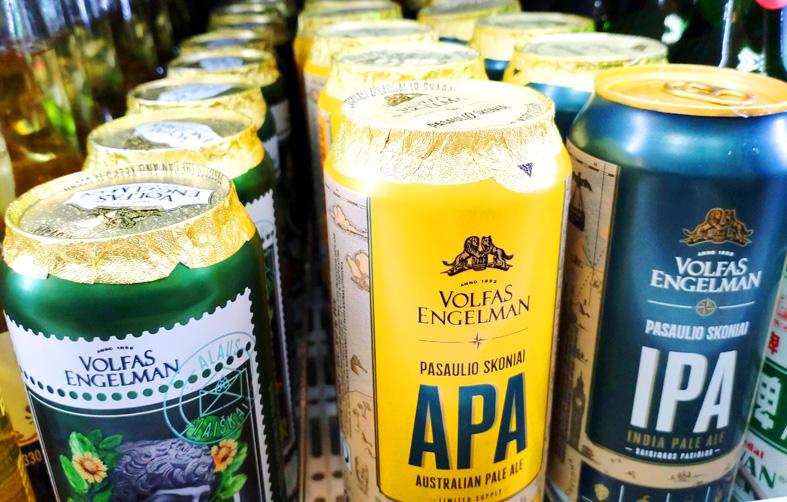A senior agriculture official in Lithuania has asked Taipei to speed up import permissions for agricultural products from the Baltic nation, as it could benefit from accessing the Taiwanese market amid economic sanctions from China.
Antanas Venckus, head of the Lithuanian Ministry of Agriculture’s International Affairs and Export Promotion Department, made the comments in an interview with the Central News Agency.
Taiwan is a potential market for Lithuania’s agricultural and food products, Venckus said.

Photo: Yang Cheng-yu, Taipei Times
As sanctions from Beijing are preventing a large number of Lithuanian companies from entering the Chinese market, Taiwanese authorities are doing their best to help the companies to redirect their agricultural shipments to Taiwan, he said.
“That’s a good move — and, of course, we appreciate that very much,” he said.
However, many of the companies are still waiting for permissions and licenses from Taiwan, Venckus added.
“We call for urgent action from the Taiwanese side to help us to make these exports eligible,” he said. “Now the ball is on the Taiwanese side and we are waiting for these actions to make these exports possible.”
Lithuania has faced increased political and economic pressure from China after it last month allowed Taiwan to open a representative office in the nation’s capital, Vilnius, with “Taiwanese” in the office’s official name.
The official names of Taiwan’s representative offices in other European countries typically use “Taipei” instead of “Taiwan” or “Taiwanese.”
China’s retaliatory actions have included recalling its ambassador to Lithuania and expelling Lithuania’s ambassador to China, as well as suspending direct freight train services to the Baltic nation and banning Lithuanian products from entering the Chinese market.
Lithuanian firms are worried about the sanctions, Venckus said.
“The biggest problem is that Lithuania disappeared from the customs system [of China] as a country of origin,” he said.
Although the Chinese said that it was a “technical problem,” everyone knows that Beijing is deliberately banning Lithuanian imports, Venckus added.
To make things worse for Lithuania, Chinese authorities are pressuring international companies to stop working with their Lithuanian counterparts.
“They are saying, if you are going to continue to cooperate with Lithuanian companies and buy components from them, we will not buy your goods — and this is a huge problem,” he said.
It was not Lithuania’s intention to negatively impact its relations with China, he said.
“Normally, we do not mix politics with the economy, but we understand that in authoritarian countries, everything is mixed together and it’s a pity that businesspeople are paying quite a high price,” he added.
No one is blaming the government, as far as he knows, as businesspeople knew that these problems would surface sooner or later, Venckus said.
“This is also a message for all the other countries in the European Union. [This is] what’s going to happen or what might happen, you know, if you are not playing according to the rules of the Chinese government, and if you defend your interests, which are based on your values,” he said.
Fortunately, other EU countries, the US and Taiwan are supporting Lithuania, he added.
Lithuania plans to send a business delegation to Taiwan headed by its agriculture minister sometime next year to enhance trade relations, he said.

The Ministry of Economic Affairs has fined Taobao NT$1.2 million (US$36,912) for advertisements that exceed its approved business scope, requiring the Chinese e-commerce platform to make corrections in the first half of this year or its license may be revoked. Lawmakers have called for stricter enforcement of Chinese e-commerce platforms and measures to prevent China from laundering its goods through Taiwan in response to US President Donald Trump’s heavy tariffs on China. The Legislative Yuan’s Finance Committee met today to discuss policies to prevent China from dumping goods in Taiwan, inviting government agencies to report. Democratic Progressive Party Legislator Kuo Kuo-wen (郭國文) said

The Ministry of Economic Affairs has fined Taobao NT$1.2 million (US$36,900) for advertisements that exceeded its approved business scope and ordered the Chinese e-commerce platform to make corrections in the first half of this year or its license would be revoked. Lawmakers have called for stricter supervision of Chinese e-commerce platforms and more stringent measures to prevent China from laundering its goods through Taiwan as US President Donald Trump’s administration cracks down on origin laundering. The legislature’s Finance Committee yesterday met to discuss policies to prevent China from dumping goods in Taiwan, inviting government agencies to report on the matter. Democratic Progressive Party

Taiwan and its Pacific ally Tuvalu on Tuesday signed two accords aimed at facilitating bilateral cooperation on labor affairs, according to Taiwan’s Ministry of Foreign Affairs (MOFA). The governments inked two agreements in Taipei, witnessed by Foreign Minister Lin Chia-lung (林佳龍) and visiting Deputy Tuvaluan Prime Minister Panapasi Nelesone, MOFA said in a news release. According to MOFA, the agreements will facilitate cooperation on labor issues and allow the two sides to mutually recognize seafarers’ certificates and related training. Taiwan would also continue to collaborate with Tuvalu across various fields to promote economic prosperity as well as the well-being of their

Sung Chien-liang (宋建樑), who led efforts to recall Democratic Progressive Party (DPP) Legislator Lee Kun-cheng (李坤城), was released on bail of NT$80,000 today amid outcry over his decision to wear a Nazi armband to questioning the night before. Sung arrived at the New Taipei District Prosecutors’ Office for questioning in a recall petition forgery case last night wearing a red armband bearing a swastika, carrying a copy of Adolf Hitler’s Mein Kampf and giving a Nazi salute. Sung left the building at 1:15am without the armband and covering the book with his coat. Lee said today that this is a serious